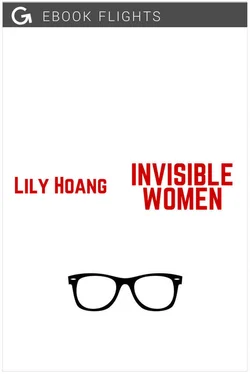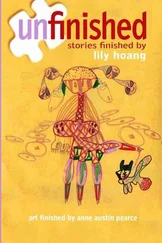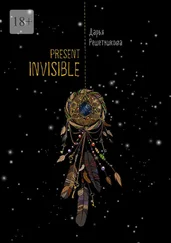Lily Hoang - Invisible Women
Здесь есть возможность читать онлайн «Lily Hoang - Invisible Women» весь текст электронной книги совершенно бесплатно (целиком полную версию без сокращений). В некоторых случаях можно слушать аудио, скачать через торрент в формате fb2 и присутствует краткое содержание. Год выпуска: 2015, Издательство: Publishing Genius Press, Жанр: Современная проза, на английском языке. Описание произведения, (предисловие) а так же отзывы посетителей доступны на портале библиотеки ЛибКат.
- Название:Invisible Women
- Автор:
- Издательство:Publishing Genius Press
- Жанр:
- Год:2015
- ISBN:нет данных
- Рейтинг книги:4 / 5. Голосов: 1
-
Избранное:Добавить в избранное
- Отзывы:
-
Ваша оценка:
- 80
- 1
- 2
- 3
- 4
- 5
Invisible Women: краткое содержание, описание и аннотация
Предлагаем к чтению аннотацию, описание, краткое содержание или предисловие (зависит от того, что написал сам автор книги «Invisible Women»). Если вы не нашли необходимую информацию о книге — напишите в комментариях, мы постараемся отыскать её.
Invisible Women — читать онлайн бесплатно полную книгу (весь текст) целиком
Ниже представлен текст книги, разбитый по страницам. Система сохранения места последней прочитанной страницы, позволяет с удобством читать онлайн бесплатно книгу «Invisible Women», без необходимости каждый раз заново искать на чём Вы остановились. Поставьте закладку, и сможете в любой момент перейти на страницу, на которой закончили чтение.
Интервал:
Закладка:
LOU: Unless the opposite hypothesis is correct: that those who suffer with dreams and aphonia, neuralgia and transference exist only because we two think of them, here, enclosed among these walls, motionless since time began.
SIGMUND: Unless toil, shouts, sores, stink do not exist; and only this azalea bush.
LOU: Unless the poor, hungry, wounded, dead exist only because we think of them.
SIGMUND: To tell the truth, I never think of them.
LOU: Then they do not exist.
SIGMUND: To me this conjecture does not seem to suit our purposes. Without them we could never remain here, cocooned in the safety of this room.
LOU: Then the hypothesis must be rejected. So the other hypothesis must be true: they exist and we do not.
SIGMUND: We have proved that if we were here, we would not be.
LOU: And here, in fact, we are.
SIGMUND: But then all these women who live down the hall, where are they?
9
The Great Freud owns an atlas where all the parts of the empirical mind and the neighboring realms are drawn, neuron by neuron, cell by cell, with folds, memories, fears, sensations. He realizes that from Lou Andreas-Salome’s tales it is pointless to expect news of those places, which for that matter he knows well: how women with hysteria wail in the moments when their control slips furthest away from their skin; how bodies can become islands where the rhinoceros rages, charging, with her murderous horn; how translucent pearl tears appear in moments of epiphany.
Sigmund asks Lou, “When you return from your journeys down the hall, will you repeat to your women the same tales you tell me?”
“I speak and speak,” Lou says, “but the listener retains only the words she is expecting. The description of the women to women you lend a benevolent ear is one thing; the description that will go the rounds of the groups of women who live down the hall, waiting eagerly outside my door is another; and yet another, that which I might dictate late in life, if I were taken prisoner by one of these women and put in irons and lace in the same room as a writer of great stories. It is not the voice that commands the story: it is the ear.”
“At times I feel your voice is reaching me from far away, while I am prisoner of a gaudy and unlivable present, where all forms of human society have reached an extreme of their cycle and there is no imagining what new forms they may assume. And I hear, from your voice, the invisible reasons which make women live, through which perhaps, once dead, they will come to life again.”
The Great Freud owns an atlas whose drawing depict the terrestrial woman all at once, a conglomeration of women, one on top of the other, a palimpsest, which seen from the distance, can be only one form, but up close, her contours shift through the translucence of skin. He leafs through the maps before Lou Andreas’s eyes to put her knowledge to the test. The woman recognizes Constantinople in the woman whose hair dominates a long strait, a narrow gulf, and an enclosed sea; she remembers Jerusalem for her set of two hills, of unequal height, facing each other; she has no hesitation in pointing to Samarkand and her gardens.
For other women, she falls back on descriptions handed down by word of mouth, or she guesses on the basis of scant indications: and so Granada, the streaked pearl of the caliphs; Dora, the neat, boreal port; Anna O., black with ebony and white with ivory; Paris, where millions of men come home every day grasping her wand of bread. In colored miniatures the atlas depicts inhabited women of unusual form: an oasis hidden in a fold of the desert from which only palm crests peer out is surely Katherina; coy smile amid quicksands and cows grazing in meadows salted by tided tears can only suggest Franziska; and a palace that instead of rising within a woman’s skin contains within its own skin a woman can only be Anna.
The atlas depicts women which neither Lou nor mothers know exist or where they are, though they cannot be missing among the forms of possible women. For these, too, Lou says a name, no matter which, and suggests a route to reach them. It is known that names of women change as many times as there are foreign languages; and that every woman can be reached through other women, by the most various calls and snickers, by those who speak, write, sing, or remain in the most quiet silent.
“I think you recognize women better on the atlas than when you visit them in person,” the psychoanalyst says to Lou, snapping the volume shut.
And Andreas answers, “Traveling, you realize that differences are lost: each woman takes to resembling all women, sex can exchange form, order, distances, a shapeless dust cloud invades my gender. Your atlas preserves the differences intact: that assortment of qualities which are like the letters in a name.”
The Great Freud owns an atlas in which are gathered the maps of all women: those whose feet rest of solid foundations, those which fell in ruins and were swallowed up by the sand, those that will exist one day and in whose place now only memory gapes.
Lou Salome leafs through the pages; she recognizes Elizabeth, Nefertiti, Virginia Woolf. She points to the landing at the mouth of Joan of Arc where ships waited for ten years. But thinking of the Greeks, she happened to see next the form Helen and Aphrodite, and from the mixture of those two women a third emerged, which might be called Yulia or Hilary, Sirivamo or Indira, a woman who may gain an empire of knowledge and understanding more vast than the Great Freud’s.
The atlas has these qualities: it reveals the form of the women that do not yet have a form or a name. The catalogue of forms is endless: until every shape has found its woman, new women will continue to be born. When the forms exhaust their variety and come apart, the end of women begins. In the last pages of the atlas there is an outpouring of networks without beginning or end, women in the shape of leaders, thinkers, writers, mothers, friends, humans without shape or borders.
Women & the Dead 5
By tomorrow morning, the woman down the hall will be dead. We wish this were some kind of petty prediction, God knows we do, but this is all true. We wish it weren’t because the truth of the matter is that we love the woman down the hall. She is our favorite tenant, but the woman down the hall, she’s cursed with clairvoyance, and she’s known since she was a child. She’s known exactly when she would die.
We remember the very first time we met her. She came to see the open apartment, and when we saw her that very first time and she saw us, she said, “Yes, this is it. This must be it.” And we had no idea what she meant, but it only took us that one meeting, those first few words, and we fell in love with her. We wanted to know more. We wanted her to stay here with us forever so when she told us about her death, we shut off our ears and refused to listen, but the truth remains that by tomorrow morning, she will be dead, and no matter what we do to try to prevent it, we won’t be able to.
We think it would be horrible to know the things she knows, but the woman down the hall is grateful. That’s the kind of woman she is. She’s the kind of woman it would be impossible not to love, and we hate her for all her kindness and understanding. We hate her for her wisdom. We hate her for her mortality.
Women & the Sky 4
The woman down the hall does not really exist. She is foam, moving between walls and into our noses and throats. Quite often, we can feel her in our bodies, moving things around. It isn’t an unpleasant feeling and we generally do not even mind. We know that the woman down the hall is trying to help us because that’s what she does. In exchange for a room for her to expand in, she offers us immunity from disease. She enters our mouths and ears and boosts our bodies with her magic.
Читать дальшеИнтервал:
Закладка:
Похожие книги на «Invisible Women»
Представляем Вашему вниманию похожие книги на «Invisible Women» списком для выбора. Мы отобрали схожую по названию и смыслу литературу в надежде предоставить читателям больше вариантов отыскать новые, интересные, ещё непрочитанные произведения.
Обсуждение, отзывы о книге «Invisible Women» и просто собственные мнения читателей. Оставьте ваши комментарии, напишите, что Вы думаете о произведении, его смысле или главных героях. Укажите что конкретно понравилось, а что нет, и почему Вы так считаете.












